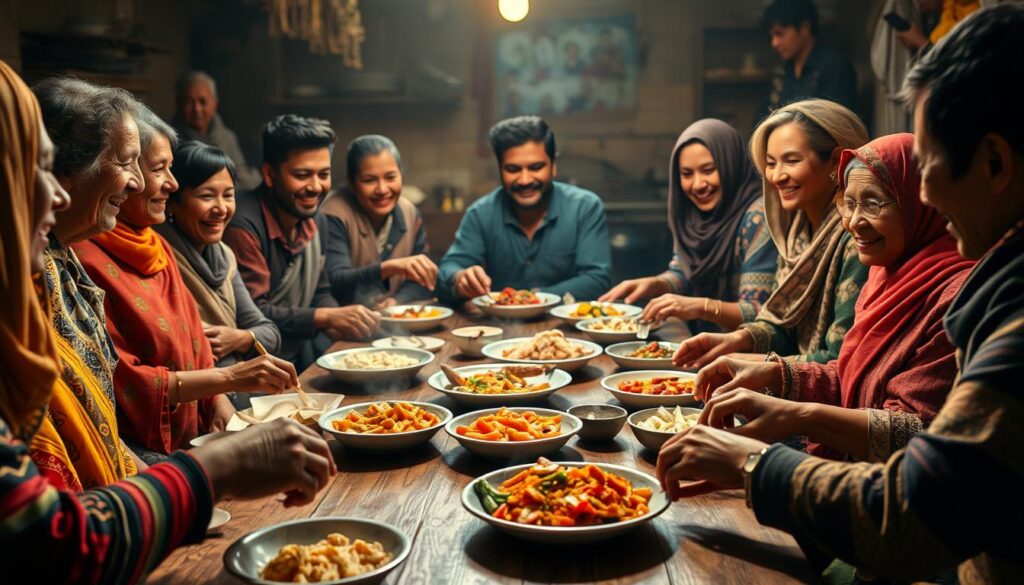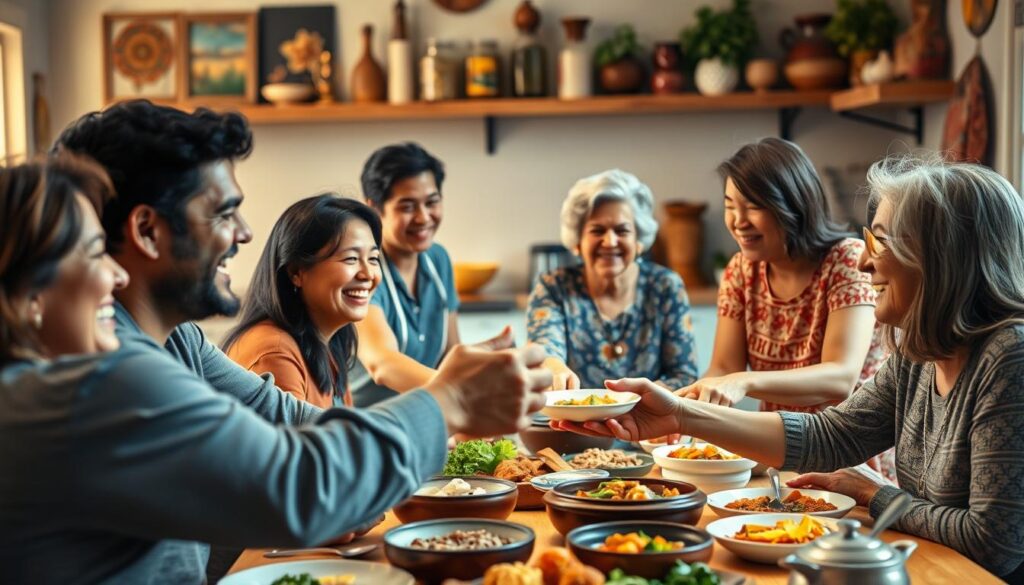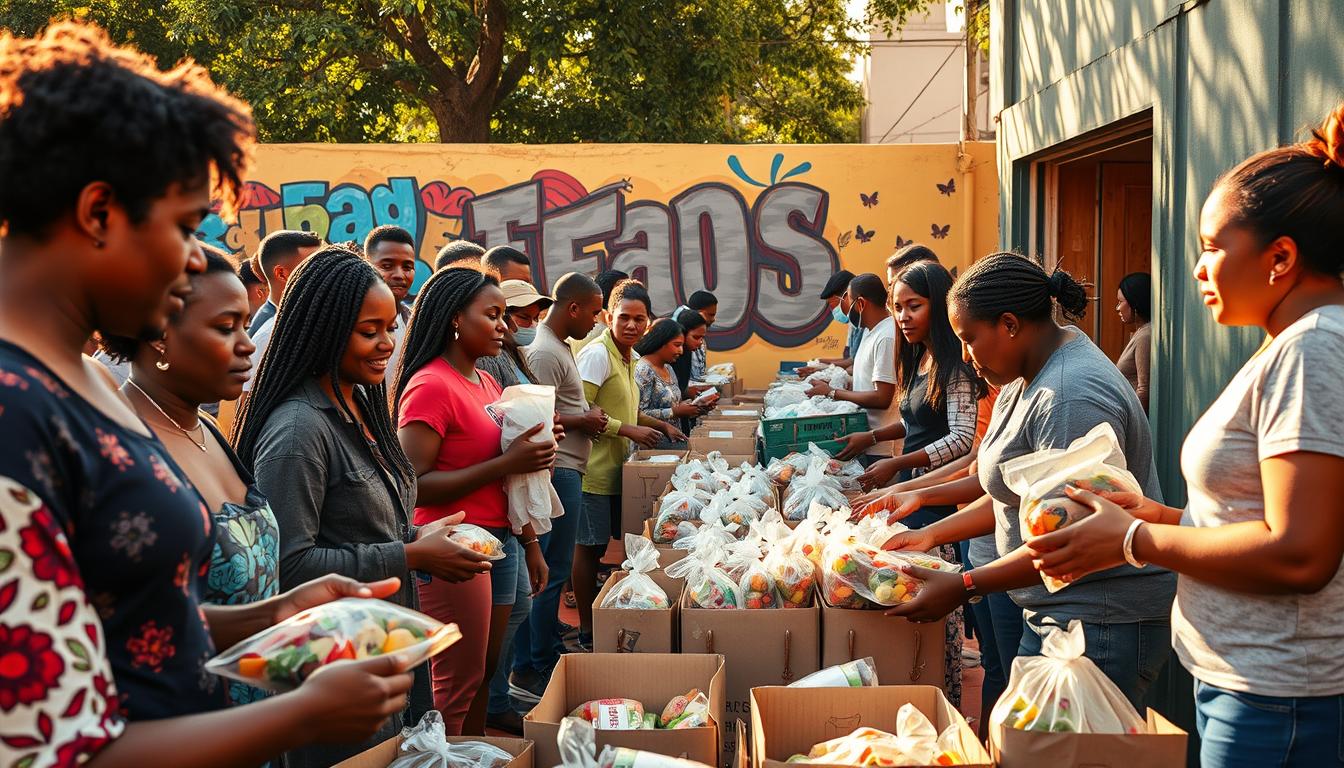Can sharing a meal turn trauma into trust in your community? Let’s see how food distribution impacts more than just hunger. It nourishes our souls too. Food programs do more than fill bellies; they mend hearts and tie communities closer.
They create a sense of togetherness and trust through shared meals. This article will talk about how faith groups help communities grow stronger together. These programs meet nutritional needs and make everyone feel like they belong.
They strengthen the ties that hold communities together. If you want to know more about food’s power in healing and trust, check out this research.
The Healing Power of Community Through Food
Sharing meals is key in building community and making everyone feel they belong. It goes beyond just eating together; it bonds people’s hearts and souls. Bible stories like the Last Supper show how meals bring people together.
Meal gatherings are perfect for building trust. Sharing food warms the heart and breaks down walls. People from all walks of life can connect deeply. There are many groups today that create events for sharing meals, which helps heal the community. These events let people share stories and find things they have in common.
Looking into faith-based food projects? See how they spread kindness and giving, just like in the Bible. By eating together, people grow closer and work together to improve their community. These special times make memories that help us feel happy and connected.
Understanding Trauma and Its Effects
Trauma deeply affects both individuals and communities. It can lead to emotional pain, anxiety, and depression. These effects make it hard for many to heal emotionally. They feel alone and cut off from those who can help.
People living on the edges of society feel trauma’s impacts even more. Things like past injustices, poverty, and losing touch with one’s culture worsen their disconnect. This not only harms their personal happiness but also weakens the strength of their communities. If we ignore trauma, whole neighborhoods suffer from deep sadness and lack of hope.
It’s important to understand the complex impact of trauma. This helps us create better ways to help. Programs that give out food, addressing both body and mind, are vital. They bring people together over meals and talks. This helps start healing and rebuilds connections within communities and among individuals.
How Food Distribution Can Heal
Food distribution is a key way to help people and communities heal from trauma. It focuses on making sure everyone has what they need to eat. This is important for the body and the mind. Things like food banks, soup kitchens, and community gardens are very helpful.
Food banks do more than just give out food. They are also places where people can find support and make friends. This can really help with their mental health. Soup kitchens bring people together for meals. This helps everyone feel more connected and safe.
Community gardens help people work together to grow their own food. This is great for fighting hunger and bringing neighbors closer. It makes the community stronger. Feeling connected is very important for healing from trauma.
Teaching people about healthy eating makes these programs even better. When people understand how food affects their mood, they see it as a way to get better. By working together, food programs can really change lives. They help fight hunger and help communities become stronger.
Building Trust Through Shared Meals
Shared meals are key for building trust and bringing people together. When people eat together, they share more than food. This sharing can break down walls and help everyone understand each other better.
Programs that focus on eating together can really change how people see one another. These meals make everyone feel they belong, which is important for trust in the community. For example, some projects show how eating together can heal deep divides caused by mistrust.
Many groups work to create these connections through food. LifeWay Programs is one such organization. Our Food Support Program helps people find food and invites them to community meals.
Eating with family often boosts emotional health and strengthens bonds. Research backs this up, showing the huge impact of sharing meals. These moments go beyond eating; they are chances for people to come together and heal.

Faith and Food Justice Initiatives
Church communities are now stepping up to fight hunger through faith-based food justice efforts. These efforts go beyond regular church services, tackling food insecurity with proactive community help. They empower locals by offering both nutritional education and resources.
Church groups have started giving out fresh food and meals to help those in need. They also offer classes on cooking nutritious meals with whatever ingredients are available. By doing this, they help communities become stronger and more self-reliant.
It is important for faith groups to work together on food justice. When they join forces, they have a bigger impact and create a caring, supportive community. Leaders from different faiths also say that providing food is a way to strengthen community bonds spiritually.
Churches are not just working locally; they’re fighting for bigger changes across the country. They speak out for laws that make healthy food easier for everyone to get. This shows how deeply faith ties into wanting to make the world a better place for all.
Real-Life Stories of Healing Through Food
Food programs have changed many lives, with lots of healing stories from individuals and families. These stories show the food distribution impact in communities, highlighting the importance of food and connections.
Families in need have gained more than food from food banks. A mother shared how weekly food deliveries helped her bond with her community again. She found support and friendship in these meals, crucial in hard times.
A local faith group’s potluck brought neighbors together. They shared homemade food and personal stories at the tables. These community testimonials prove how eating together can help people heal, offering a space to share joys and challenges. Elderly people enjoy the meals and feel less isolated, boosting their mood. Sharing meals helps them find peace and purpose in life. The impact of these efforts is huge. They do more than feed people; they build healing and empowering community bonds.

Conclusion
The role of food distribution is much more than just feeding people; it’s a key tool for healing and bringing people together. When we address food insecurity, we’re not just giving out food. We’re creating places where people feel supported and can start to trust again. This is essential for getting past the trauma that comes with not having enough to eat and shows how vital trust is for hope.
By involving locals in the planning and carrying out of these programs, we make a bigger impact on mental health and community strength. People get a sense of power when they help their community bounce back. This helps everyone heal. Whether it’s through schools or local programs, your part in this is huge.
Now’s the time for you to step up. By joining food justice work, volunteering, or giving to groups like Lifeway Center, you make a big change. We can all help build trust in our communities while fighting hunger and meeting nutritional needs. Join us in creating a healthier, more united place. See how you can get involved with Lifeway Center today.


